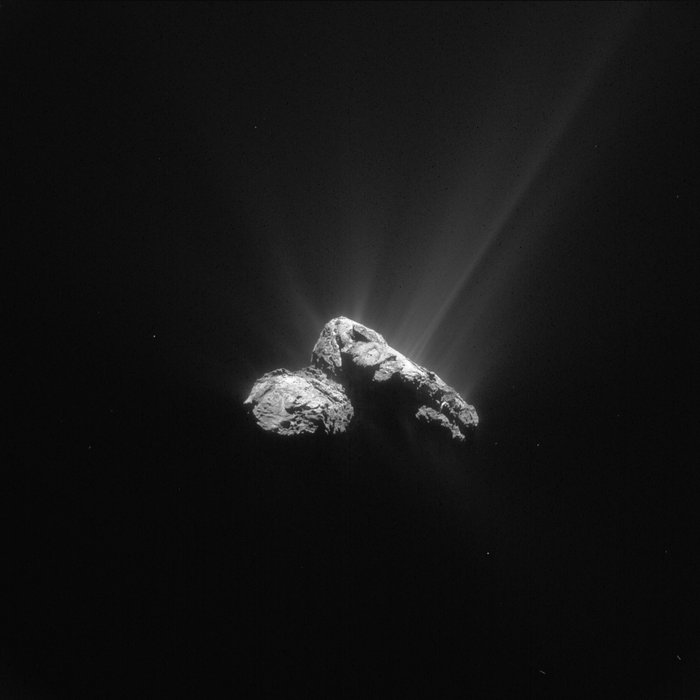
The European Space
Agency has had no new news on the Philae Lander since July 20th. It
seems safe to say that we should bid Philae a fond farewell. The Rosetta
mission to Comet 67P/Churyumov-Gerasimenko has accomplished many of its aims; but, the lander achieved only a small portion of its goals due to a bouncy
landing on the comet. The comet has very weak gravity and so it was difficult, to
say the least, to achieve a landing. The landing could be compared to dropping
a Wham O Superball off of a skyscraper and predicting where it would land. Philae was able to send back 57 hours of data
and photos from three locations on the comet as it bounced, rocked, and rolled
its way to an unstable resting place and then “collected its thoughts”
regarding its unexpected position.
ESA had expected that they would have much more time to collect data sent from
Philae. The “little lander that could” was supposed to rest comfortably in a
place where the sun would shine on its solar panels and provide it with plenty
of power. But a troublesome cliff that blocked the activity of the solar cells
proved too difficult to overcome.
Agency has had no new news on the Philae Lander since July 20th. It
seems safe to say that we should bid Philae a fond farewell. The Rosetta
mission to Comet 67P/Churyumov-Gerasimenko has accomplished many of its aims; but, the lander achieved only a small portion of its goals due to a bouncy
landing on the comet. The comet has very weak gravity and so it was difficult, to
say the least, to achieve a landing. The landing could be compared to dropping
a Wham O Superball off of a skyscraper and predicting where it would land. Philae was able to send back 57 hours of data
and photos from three locations on the comet as it bounced, rocked, and rolled
its way to an unstable resting place and then “collected its thoughts”
regarding its unexpected position.
ESA had expected that they would have much more time to collect data sent from
Philae. The “little lander that could” was supposed to rest comfortably in a
place where the sun would shine on its solar panels and provide it with plenty
of power. But a troublesome cliff that blocked the activity of the solar cells
proved too difficult to overcome.
Meanwhile, Rosetta,
the Comet orbiter and companion vehicle to Philae has
sent back a wealth of data and photos. (See the links here and here as well.) Rosetta is relaying information that shows how a comet responds to solar winds
as it gets closer to our sun.
Rosetta, along with Philae, has also shown that the comet itself is not magnetised,
answering one of the great questions about comets and their activity.
the Comet orbiter and companion vehicle to Philae has
sent back a wealth of data and photos. (See the links here and here as well.) Rosetta is relaying information that shows how a comet responds to solar winds
as it gets closer to our sun.
Rosetta, along with Philae, has also shown that the comet itself is not magnetised,
answering one of the great questions about comets and their activity.
The European Space
Agency has truly sparked our collective imagination regarding comets in our
solar system. They have faithfully exhibited the pioneering and exploratory spirit that shows humanity at its best. We thank them for their work and their expansion
of our knowledge regarding science and the dynamics of comets.
Agency has truly sparked our collective imagination regarding comets in our
solar system. They have faithfully exhibited the pioneering and exploratory spirit that shows humanity at its best. We thank them for their work and their expansion
of our knowledge regarding science and the dynamics of comets.